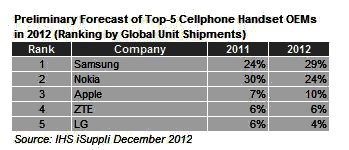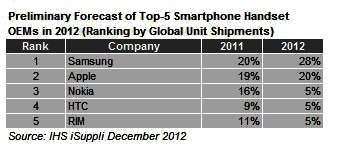PREVIOUS ARTICLENEXT ARTICLE
NEWS

Samsung knocks Nokia as top mobile vendor 2012 - IHS iSuppli
By Hanleigh Daniels 19 December 2012 | Categories: news
At the beginning of this year, market research firm Strategy Analytics (SA) revealed that Samsung managed to overtake Nokia for the first time in terms of global mobile phone shipments during Q1 2012. Now data analytics company IHS iSuppli has rubbed more salt in Espoo’s wound, by forecasting that Samsung will be the top mobile OEM (original equipment manufacturer) over the entire 2012 period.
According to IHS iSuppli’s mobile and wireless communications service, this will mark the first time Nokia has been regulated to the runner-up position in 14 years.
Korean tech giant Samsung is expected to account for 29% of all worldwide cellphone shipments, representing a 5% growth over 2011’s 24%. Nokia’s share this year will decrease to 24%, down from last year’s market leading 30%.
Apple lands the final spot on the worldwide mobile phone shipment podium, snapping up a 10% stake in the market (up from 2011’s 7%) to finish ahead of ZTE and its unchanged 6% market share. Samsung’s Korean neighbour, LG, occupies fifth place after its market share fell from 6% in 2011 to 4% in 2012.
According to IHS iSuppli’s mobile and wireless communications service, this will mark the first time Nokia has been regulated to the runner-up position in 14 years.
Korean tech giant Samsung is expected to account for 29% of all worldwide cellphone shipments, representing a 5% growth over 2011’s 24%. Nokia’s share this year will decrease to 24%, down from last year’s market leading 30%.
Apple lands the final spot on the worldwide mobile phone shipment podium, snapping up a 10% stake in the market (up from 2011’s 7%) to finish ahead of ZTE and its unchanged 6% market share. Samsung’s Korean neighbour, LG, occupies fifth place after its market share fell from 6% in 2011 to 4% in 2012.

Table: IHS iSuppli
Smartphones are the engine for mobile phone growth
Wayne Lam, senior analyst for wireless communications at IHS explained that, “The competitive reality of the cellphone market in 2012 was live by the smartphone; die by the smartphone.”
“Smartphones represent the fastest-growing segment of the cellphone market – and will account for nearly half of all wireless handset shipments for all of 2012. Samsung’s successes and Nokia’s struggles in the cellphone market this year were determined entirely by the two companies’ divergent fortunes in the smartphone sector,” Lam concluded.
Global smartphone shipments are set to rise by 35.5% this year, while overall cellphone shipments will only increase by around 1%, resulting in a smartphone penetration rate of 47%, compared to 2011’s 35%.
IHS iSuppli anticipates that the global smartphone market penetration rate will increase to 56% next year, signalling a significant tipping point in the mobile phone market, as the smartphone assumes the dominant position in the industry for the first time.
Samsung’s success vs. Espoo’s nosedive
According to IHS iSuppli, Samsung’s success has been built on its “fast follower” strategy for design and manufacturing, which sees the firm delivering dozens of new smartphone models annually to address all segments of the market ranging from top-end mobiles through to entry-level devices. The Korean company monitors the big trends in smartphone design, user needs as well as unmet market opportunities, and then creates products to fit those markets “quickly and efficiently”.
Samsung is expected to post the best performance among the Top 5 smartphone brands for 2012, courtesy of its share of global smartphone shipments rising 8 percentage points to 28%, up from last year’s 20% stake.
Nokia, on the other hand, has been hampered by the transition of its smartphone range to Windows Phone OS, resulting in a steep decline in shipments for the company. IHS iSuppli asserts that sales of the company’s older Symbian-based smartphones have decreased considerably, whilst its new Lumia range of Windows Phone-based handsets have not managed to make up the loss. Espoo is anticipated to experience the largest decrease in smartphone shipments, with its market share dropping by 11 percentage points to 5% during 2012.

Table: IHS iSuppli
Samsung widens gap between itself and Apple
According to IHS iSuppli, Samsung and Apple ended 2011 with a neck-and-neck battle for leadership in the smartphone market, with only 1 percentage point of market share separating the two tech giants. This year, however, Samsung pulled decisively ahead of Cupertino thanks to its wide range of Android-powered smartphone offerings.
Samsung made significant gains both at the top end of the smartphone sales spectrum as well as the low-cost market with its Galaxy line of smartphones, thus enabling the company to reach a much larger target audience with its phones than Apple’s high-end-only iPhone line-up.
The Samsung and Apple duopoly represents the dominant force in the smartphone market, with the two companies accounting for 49% of shipments in 2012, up from 39% in 2011. While rivals such as Nokia and BlackBerry maker RIM (Research in Motion) also held double-digit shares of the market in 2011, Samsung and Apple remain the only two players that will each command a double-digit portion of the smartphone space this year.
RIM and HTC faces tough challenges
Taiwanese smartphone and tablet maker HTC (which produced one of our Top 5 smartphones of 2012) and Canadian firm RIM struggled throughout 2012 in the smartphone market. IHS iSuppli stated that HTC is facing an upstream battle against Samsung within the Android-based smartphone space, as its market share fell from 9% last year to 5% in 2012.
With its BlackBerry 10-operating smartphones only slated for release at the beginning of next year, RIM saw its market share slip as its traditionally strong enterprise consumer base dwindled. The company’s market share will fall to 5% during 2012 according to IHS iSuppli, marking a decrease from 2011’s 11% stake.
According to IHS iSuppli, Samsung and Apple ended 2011 with a neck-and-neck battle for leadership in the smartphone market, with only 1 percentage point of market share separating the two tech giants. This year, however, Samsung pulled decisively ahead of Cupertino thanks to its wide range of Android-powered smartphone offerings.
Samsung made significant gains both at the top end of the smartphone sales spectrum as well as the low-cost market with its Galaxy line of smartphones, thus enabling the company to reach a much larger target audience with its phones than Apple’s high-end-only iPhone line-up.
The Samsung and Apple duopoly represents the dominant force in the smartphone market, with the two companies accounting for 49% of shipments in 2012, up from 39% in 2011. While rivals such as Nokia and BlackBerry maker RIM (Research in Motion) also held double-digit shares of the market in 2011, Samsung and Apple remain the only two players that will each command a double-digit portion of the smartphone space this year.
RIM and HTC faces tough challenges
Taiwanese smartphone and tablet maker HTC (which produced one of our Top 5 smartphones of 2012) and Canadian firm RIM struggled throughout 2012 in the smartphone market. IHS iSuppli stated that HTC is facing an upstream battle against Samsung within the Android-based smartphone space, as its market share fell from 9% last year to 5% in 2012.
With its BlackBerry 10-operating smartphones only slated for release at the beginning of next year, RIM saw its market share slip as its traditionally strong enterprise consumer base dwindled. The company’s market share will fall to 5% during 2012 according to IHS iSuppli, marking a decrease from 2011’s 11% stake.
In other mobile phone shipment related news, market research company International Data Corporation recently forecasted that the worldwide mobile phone market will only grow 1.4% year-on-year during 2012, marking the lowest annual growth rate for the industry in three years.
USER COMMENTS
Most Read Articles
Read

Magazine Online
TechSmart.co.za is South Africa's leading magazine for tech product reviews, tech news, videos, tech specs and gadgets.
Start reading now >
Download latest issue
Have Your Say
What new tech or developments are you most anticipating this year?
New smartphone announcements (45 votes)
Technological breakthroughs (29 votes)
Launch of new consoles, or notebooks (14 votes)
Innovative Artificial Intelligence solutions (29 votes)
Biotechnology or medical advancements (24 votes)
Better business applications (160 votes)



